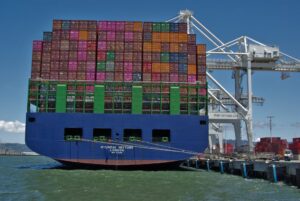Construction of the US$500 million Liverpool2 container terminal at the Port of Liverpool has reached its next milestone. Work to reclaim 12ha of land has passed the first stage with further infilling due to take place over the summer.
The majority of 296 steel piles have been driven into the seabed, allowing the infilling of 1.43 million tonnes of sand and silts taken from the Mersey estuary and deposited behind the new quay wall.
Doug Coleman, Liverpool2’s Construction Director, said: “There are very few projects of this kind and scale going on in the UK, especially considering the impact of the exceptional tidal range.
“We can only carry out the installation of anchor blocks and other infrastructure, including vibrocompaction, for a maximum of eight hours each day – two hours either side of each low tide. The one benefit is that the weight of water during high tide helps to compress the infilled material.
“Thanks to the project being ‘all-weathered’, the tide is the only major challenge we face from the elements, although high winds or freezing conditions inevitably mean that work has to be carried out slightly differently to minimise any consequent risks.”
The piling process, which began in 2014 and is due to be completed in the next few months, involves drilling from large jack-up rigs and inserting tubular piles to create a new 854m long quay wall.
The infilling process began in February with the arrival in the river Mersey of the ‘Willem van Orange’ trailer suction hopper dredger. The vessel, operated by Dutch specialist Van Oord, has a handling capacity of 10,000m3 (21000 tonnes).
The dredger is due to return at the beginning of July to begin the second campaign of infilling, which will see a further four million tonnes of dredged material being harvested from the river.
As well as the further infilling, the next major phases of the work will include installation of capping beams, with bollard and fender blocks, and pocket dredging for the delivery of ship to shore cranes.
The site will be open towards the end of December 2015.








